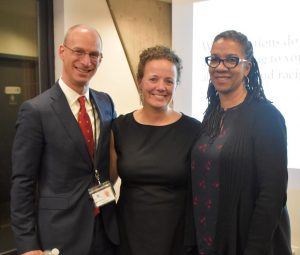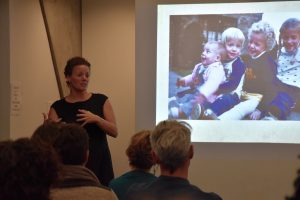 Dr. Scott Gaynor, Dr. Ali Michael, and Traci Lester pose after the lecture.
Dr. Scott Gaynor, Dr. Ali Michael, and Traci Lester pose after the lecture.
Over the last year, the Parents’ Association Diversity & Inclusion Committee has been sponsoring an ongoing series of lectures that tackle a variety of topics. In September, Glenn Singleton, founder and president of Pacific Educational Group and author of Courageous Conversations About Race: A Field Guide for Achieving Equity in Schools spoke at Gaynor. Other guest speakers have included Dr. Derald Wing Sue and Andrew Solomon. On Thursday, February 1, Dr. Ali Michael led a discussion titled “Building Healthy Multiracial Communities: What Do White Children Need to Know About Race?”
Michael is the co-founder and director of the Race Institute for K-12 Educators, and the author of Raising Race Questions: Whiteness, Inquiry, and Education. Michael opened her presentation by discussing her upbringing in a town that was 99.8 percent white. Although not legally or officially segregated, it was so, due to its homogenous population where many residents took a “colorblind” approach to race and racism. According to Michael, talking about race where she grew up was placed in a category similar to politics, money, or religion – don’t. Looking back she recognizes the harm that causes, and uses that as a foundation for her presentations; not only do families need to talk about race, but they need to do so often. Making conversations ongoing is crucial, according to Michael. “You cannot only talk about race when there is a problem because then you’re only ever associating race with problems. And if you make the conversations ongoing, then you will also be more suited to talk about it when there is a problem.”
“There is a difference between racial talk and racist talk and it is important to learn to differentiate,” said Michael. When it comes to educating your children about racism and race, there are several constructive ways to approach it. According to Michael, it is valuable to be able to name differences without judgment. “Difference is good, we’re not all the same,” she said. Also, it is important to learn and remember to cultivate critical media analysis skills not only within yourself, but to instill that skill in your children. The example Michael shared at the lecture was about her own children’s experience with Disney princesses. For example, most of the Disney princesses are white. “Why is that?” Michael probed. This example was her segue to a larger point that critical observation is important, as is encouraging your children to notice things and challenge them and the status quo, rather than simply accepting things as they are. After answering questions at the end of her presentation, Michael acknowledged these complex topics cannot be covered in one night. She shared handouts with all the attendees with resources parents could explore and use with their children, including books, articles, and research. See below for some of Dr. Michael’s recommendations.
Dr. Ali Michael’s Recommendations for Additional Education
- NurtureShock by Bronson and Merryman
- A Different Mirror: A History of Multicultural America by Ronald Takaki
- Everyday Antiracism by Mica Pollock
- Uprooting Racism: How White People Can Work for Racial Justice by Paul Kivel
- Starting Small: Teaching Tolerance in PreSchool and the Early Grades by the Teaching Tolerance Project
Thank you to Gaynor’s Parents’ Association Diversity & Inclusion Committee for sponsoring this lecture.

